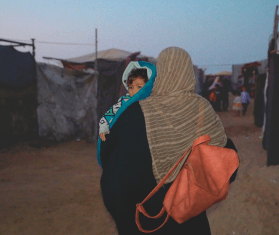NEW YORK/GENEVA, November 28, 2023—Too little is being done to protect the most vulnerable people against the impacts of climate change, the international medical humanitarian organization Doctors Without Borders/Médecins Sans Frontières (MSF) said today. World leaders gathering in Dubai at the annual United Nations climate meeting (COP28) over the next two weeks must take urgent action to protect the health of people in the world’s most affected communities, which are many of the same in which MSF provides medical care.
The climate emergency is a health and humanitarian emergency. Severe health impacts of climate change are already affecting people across the globe and are projected to increase over time as the planet heats up. The people who are the least responsible for the greenhouse gas emissions that have caused the climate crisis are suffering the worst consequences since they have the fewest resources to adapt to their new realities and mitigate the impacts of climate change.
“The world’s most vulnerable people are paying with their health and their lives for a problem they did not create,” said Dr. Christos Christou, MSF’s international president. “It is both absurd and tragic that those who are the least responsible for the emissions that have caused the climate emergency are left to suffer the consequences. This shows that we are not just in a crisis of climate, but also in a crisis of humanity and solidarity.”
Each day, MSF teams treat patients experiencing the health impacts of climate change firsthand—from widespread flooding in South Sudan, severe cyclones in Myanmar, Madagascar, and Mozambique, and relentless heat and extended droughts that have driven millions to the edge of starvation across the Horn of Africa. MSF has also responded to multiple concurrent cholera outbreaks in several countries and alarmingly high rates of dengue fever across the Americas. The deadly mix of malaria and malnutrition has kept pediatric wards full across the Sahel, including in eastern Chad, where people have sought safety from gruesome conflict in Sudan.
“Climate change is not a future problem; it is happening now,” Dr. Christou said. “We see the impacts in our waiting rooms because global political leadership has failed to deliver on commitments to curb emissions and deliver on their promises to support the most affected countries to adapt.”
As global leaders at COP28 take stock of the progress to meet climate goals, it is already clear that lack of climate action has put people’s health at great risk. Failing to cap global heating at 1.5 degrees Celsius is an existential threat for many people in the humanitarian contexts where MSF works.
In photos: The health effects of climate change in Old Fangak
Read moreThe most affected communities and countries have repeatedly asked for, but are not receiving, the support they need to deal with the consequences of climate change. They need real commitments to reduce greenhouse gas emissions, and they need significant concrete financial and technical support. The world cannot continue to look on as humanitarian crises become more severe, and the world’s most vulnerable people continue to bear the consequences.
“We cannot afford another failure,” Dr. Christou said. “How many more years will go by? How many more COPs? How many more lives will be affected—or lost—before concrete measures are decided and acted upon?”




